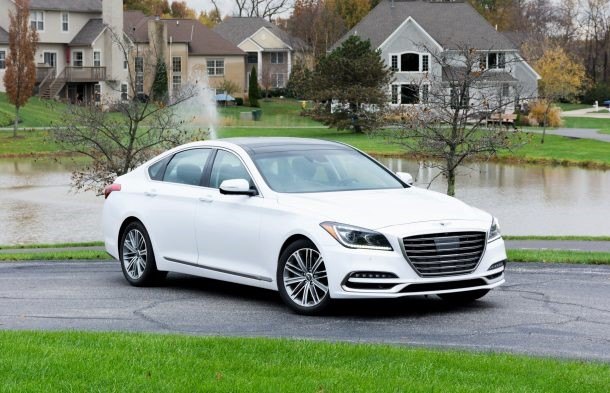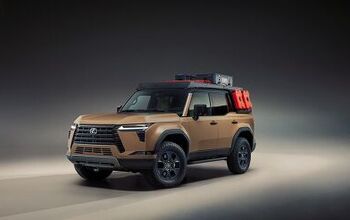2018 Genesis G80 AWD Review - Benchmarking the Big Boys, on a Budget

2018 Genesis G80 AWD 3.8
Numerous proverbs and quotes, variously attributed to Colton, Wilde, Marcus Aurelius, and others, can be distilled into the familiar “imitation is the sincerest form of flattery.” The line has been cited by college plagiarists for ages.
Industry uses a better euphemism – benchmarking. Evaluating the competition to offer an alternative that’s remarkably similar to existing products, but with enough differentiation to compel converts, is the essence of product development, no matter what the widget might be.
It’s only natural that when Hyundai decided to build a midsize luxury sedan for its Genesis luxury sub-brand, it looked closely at the two German models that have consistently led this market. Whether buyers see the 2018 Genesis G80 as a legitimate contender is up for debate, as the biggest divergence from the standard – at least on the surface – is the price.
Maybe calling this a budget luxury sedan is a stretch – after all, the car I drove retails for over fifty-five grand, which is well beyond the average new car purchase price. But look at those two big players in the midsize luxury sedan market. Both the BMW 5 Series and the Mercedes-Benz E-Class start around $55,000 when fitted with all-wheel drive like this G80 – and at that price, both are powered by turbocharged 2.0-liter four-cylinder engines, rather than Genesis’ V6.
Dimensionally, the Genesis G80 is similar to both the BMW and the Mercedes-Benz in every significant interior dimension save rear-seat legroom, where the G80 is marginally larger than the Germans. The extra power generated by the Genesis 3.8-liter V6 is needed, as the Korean is at least 300 pounds porkier than the others.
The extra weight and power do negatively affect the Genesis G80 at the fuel pump – the EPA rates the G80 at 20 mpg combined, whereas the E300 4Matic rates a 24 mpg figure, and the 530i X Drive, 27 mpg. In real world use, the German turbos probably won’t quite meet those numbers, but there is a price to pay for V6 power. I saw 20.1 mpg while driving the G80.
The G80 is quite composed in driving, though the weight means it isn’t a tossable handler. The ride is solid and genteel, and impressively quiet at highway speeds. Potholes never upset the ride, only transmitting a muted thud to the cabin.
A minor strike (for some) against the G80 is the styling, which is rather generic. I’d doubt that it will be considered an icon of timeless design in a generation or two – but it’s inoffensively handsome. The refrigerator white finish on my test car doesn’t do the G80 any favors – Genesis offers a magnificent Adriatic Blue that makes the car look at once stately and vibrant.
The interior is incredibly comfortable – the perforated leather covering the heated and cooled seats is soft and supple, and the seats quite supportive. The extending lower bolster on the driver’s seat is appreciated by those of us long of thigh, though the gap revealed when extended can pinch the driver’s nether regions if not careful when retracting. I love the subtle grey piping on the front and rear seats.
The 8.0-inch touchscreen for the infotainment system will be familiar to anyone who has sat in a newer Hyundai. It’s one of the best, most intuitive systems I’ve used. As good as it is, the console-mounted knob is rather superfluous. While it gives another option to control the audio and navigation beyond the touchscreen, it’s just not quite as user-friendly. Between the touch screen and the steering wheel controls, I didn’t see any need for the third controls.
For me, the only things that hold the Genesis G80 back are the other cars in the showroom – especially in the interior. Take a seat in a Sonata, and then in a G80. The family resemblance is quite clear in the switchgear and the infotainment systems. That’s not a knock on the G80; it just shows how good the Sonata is. But buyers expect more for their money, and on those things drivers touch every day, there isn’t a big enough difference.
In other words, Genesis must overcome buyer perception. The car is competitive. But long-time luxury buyers have a few brands in mind when shopping, and aren’t likely to walk into a Hyundai dealership. When Genesis builds out an independent dealer network, that could be a tipping point for those conquest buyers.
I’m looking forward to what Genesis offers in the future. The G80 is an impressive effort – one that can compete well with the established players in the midsize luxury market.
[Images: © 2018 Chris Tonn/TTAC]

Some enthusiasts say they were born with gasoline in their veins. Chris Tonn, on the other hand, had rust flakes in his eyes nearly since birth. Living in salty Ohio and being hopelessly addicted to vintage British and Japanese steel will do that to you. His work has appeared in eBay Motors, Hagerty, The Truth About Cars, Reader's Digest, AutoGuide, Family Handyman, and Jalopnik. He is a member of the Midwest Automotive Media Association, and he's currently looking for the safety glasses he just set down somewhere.
More by Chris Tonn
Latest Car Reviews
Read moreLatest Product Reviews
Read moreRecent Comments
- Dave M. IMO this was the last of the solidly built MBs. Yes, they had the environmentally friendly disintegrating wiring harness, but besides that the mechanicals are pretty solid. I just bought my "forever" car (last new daily driver that'll ease me into retirement), but a 2015-16 E Class sedan is on my bucket list for future purchase. Beautiful design....
- Rochester After years of self-driving being in the news, I still don't understand the psychology behind it. Not only don't I want this, but I find the idea absurd.
- Douglas This timeframe of Mercedes has the self-disintegrating engine wiring harness. Not just the W124, but all of them from the early 90's. Only way to properly fix it is to replace it, which I understand to be difficult to find a new one/do it/pay for. Maybe others have actual experience with doing so and can give better hope. On top of that, it's a NH car with "a little bit of rust", which means to about anyone else in the USA it is probably the rustiest W124 they have ever seen. This is probably a $3000 car on a good day.
- Formula m How many Hyundai and Kia’s do not have the original engine block it left the factory with 10yrs prior?
- 1995 SC I will say that year 29 has been a little spendy on my car (Motor Mounts, Injectors and a Supercharger Service since it had to come off for the injectors, ABS Pump and the tool to cycle the valves to bleed the system, Front Calipers, rear pinion seal, transmission service with a new pan that has a drain, a gaggle of capacitors to fix the ride control module and a replacement amplifier for the stereo. Still needs an exhaust manifold gasket. The front end got serviced in year 28. On the plus side blank cassettes are increasingly easy to find so I have a solid collection of 90 minute playlists.













































Comments
Join the conversation
Just returned a 2015 Ultimate RWD Hyundai Genesis with 26.1K miles. They loved me! Sold within days. The car was nice, but not BMW or MB nice. But what really killed it for me was the lousy Hyundai experience. I suspect my local dealer will get a dedicated Genesis bldg but if they don't step up the game it will all be for naught.
"I saw 20.1 mpg while driving the G80." 311 bhp @ 6K and 293 ft-tq @ 5K out of a V6 while being smog strangled with OHC, and 20mpg on corn juice? Most impressive